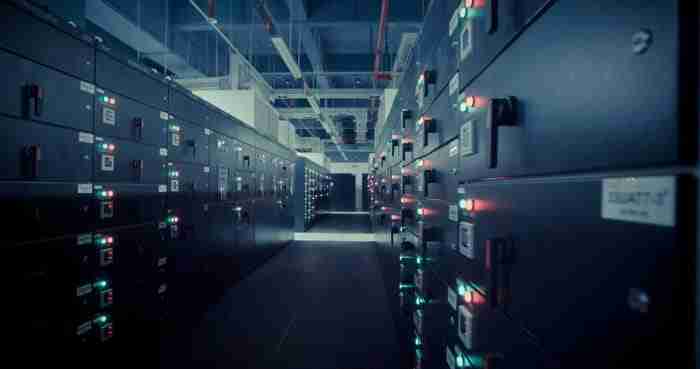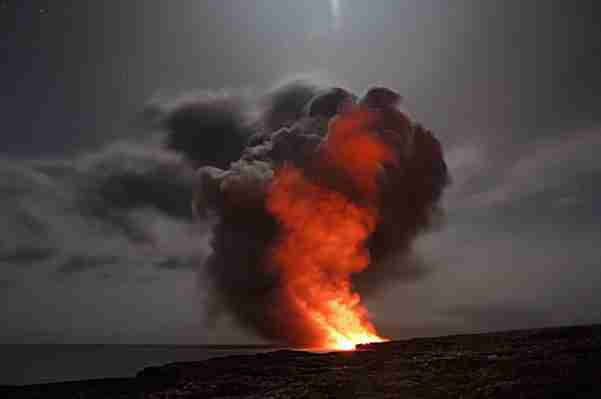What would it take for the cloud to fail?
Life is pretty much in the cloud nowadays.
Information, money, stastistics, websites, Steam’s video game data…all of these things are stored in the internet, which means the destruction of the cloud would probably lead to some level of worldwide chaos!
So, who doesn’t enjoy imagining the chances of an apocalypse? We’re going to spend some quality time considering…
What would it take for the cloud to fail?
What the Cloud is

Hopefully it’s becoming common knowledge to internet users that the actual “internet” is comprised of huge data centers that are owned and operated by some of the world’s largest corporations: Facebook, Microsoft, Amazon, Google, etc. Want to visit a website? Your computer locates the information inside the data centers using the web address, it “requests” the website, and the server sends data to your computer…
Hence why our Computer and Information Sytems teacher always said: “You don’t visit a website, the website visits you.” (Side note: that’s also why you should never visit a malicious site, viruses can enter before you choose to “download” anything at all!)
Now, while it may seem scary that large companies run these data centers, we promise it’s a very good thing for a specific reason: safety! Before the cloud can fail, something would need to happen to these data centers, but thankfully they’re built at top of the line facilities, in safe locations near large population centers (and apparently the ocean , soon enough).
Which brings us back to the question: what would it take for those cloud servers to fail?
The Disasters
Massive Gray Failure

Surprisingly, the internet isn’t perfect! Get this: the software, the coding itself, that organizes information in the cloud is constantly being updated and improved, which means slight failures happen. Even more surprising, the hardware itself (the physical data banks) can experience issues like data loss, shutdown, and more!
Some of those issues, considered “normal” failures, are detected and rectified regularly (like bank shutdown caused by overheating). However, other problems like data loss aren’t always so easy to track!
These are “gray failures”: problems that cloud creators cannot track. However…users are often quick to notice! Their computers are slow, their email is offline, their information is missing. This difference between the perceptions of users and creators is called differential observability, and it can lead to pretty large meltdowns.
What are the odds?
For this flavor of failure, we’re still going to give it a highly unlikely . Gray failures are usually isolated issues that slow internet service and drop data rather than shut down entire facilities. Also, given the fact that there are many data centers around the world, this just doesn’t have the power to wipe away the cloud. However…
Natural Disasters

Hurricanes, fires, floods, volcanos, earthquakes, and more! We’ll assume you understand the basics of these events and go right to…
What are the odds?
Luckily, the odds are still pretty small , for a few reasons. First, as we mentioned, data centers are often located in areas known for having relatively few natural disasters, which reduces the overall potential of widespread failure from one or two earthbound cataclysmic events.
Also, thanks to the sturdy construction of the facilities, we can likely rule out hurricanes, fires, and floods, even in their most powerful incarnations. While these may shut down the servers temporarily and destroy a tower of two, they’re probably not even going to wholly destroy a facility.
Earthquakes of sufficient size could permanently destroy a data center! But once again, these are isolated incidents that would only hit maybe a few centers at a time. San Andreas would have to really ratchet up that seismograph and bring Yellowstones to the party, because…
Volcanoes could easily destroy a data bank, but it’s unlikely they’re going to suddenly rear up from the ground for pinpointed strikes on all data banks collectively! So lame.
When it comes down to it, there would need to be a bunch of biblical floods, world-ending tornadoes, tactical volcanoes, and shattering earthquakes to bring the entire cloud down to earth. Of course, at that point, we’re looking at armaggedon by natural disasters anyway, so what’s really the point?
THE SUN!
Doesn’t count as a natural disaster? Sweet! Becuase this is cool.
Some background and vocab: every once in a while, a solar flare (bright flash on the sun’s surface), is accompanied by a coronal mass ejection (big burst of plasma with a huge magnetic field). This acts like electromagnetic pulses (EPM’s) when they hit earth, and are called “ solar storms “.
Remember the disaster from the Maze Runner trilogy? Totally possible. Except maybe for the Cranks.
What are the odds?
Actually pretty decent . A solar storm could put many data centers out of order, and a sufficiently large one could even torch the planet! But…
We presume the magnetic field wouldn’t pass through earth, so it’s likely a lee would be created on the side our planet that is opposite the solar storm’s landing zone, meaning not everything would be destroyed.
Also, ONCE AGAIN, if the solar flare really was that powerful it’s possible we’d be looking at a Maze Runner situation, where some parts of the earth are doomed to experience a sun-scorched apocalypse anyway. So again…the cloud failing is the least of our problems there.
Finally, coronagraphs can spot these jets of plasma, so it’s likely data centers would scramble to insulate their hardware somehow (“If we can stop Superman’s x-ray vision, we can stop the sun!” – probably the U.S. president at the time).
Still…with the right-sized storm, maybe drawn out successive waves to make sure all of earth is good and EMP’d, the cloud could be destroyed!
Human Involvement
In the end, the most likely enemy of the internet is, well, us.
Maybe a mom’s Facebook group gets tired of their kids’ video gaming and decides to truly shut down the internet. Maybe the “Storm Area 51” crowd declares a march on the data banks next. Or perhaps the companies in charge of these information centers randomly decide they want to commit corporate suicide and take humanity to the stone age in a handbasket.
You know, those incredibly likely situations. Because, when it comes down to it, it would literally take an act of God to destroy the cloud all at once through system failure and assorted environmental mayhem.
So, in the end, humans more likely than anything else (even the sun) to decide the cloud needs to die…
And on another note, “The Cloud Needs to Die” sounds like a pretty decent James Bond title!
Conclusion
Any type of technology can fail, it’s only a matter of what kind of catastrophe is required to keep it down. If you’re truly concerned about such a thing happening, remember this key piece of tech advice: always back up your important files. Family photos, your novel, and that graphic design project. Stay safe, friends!